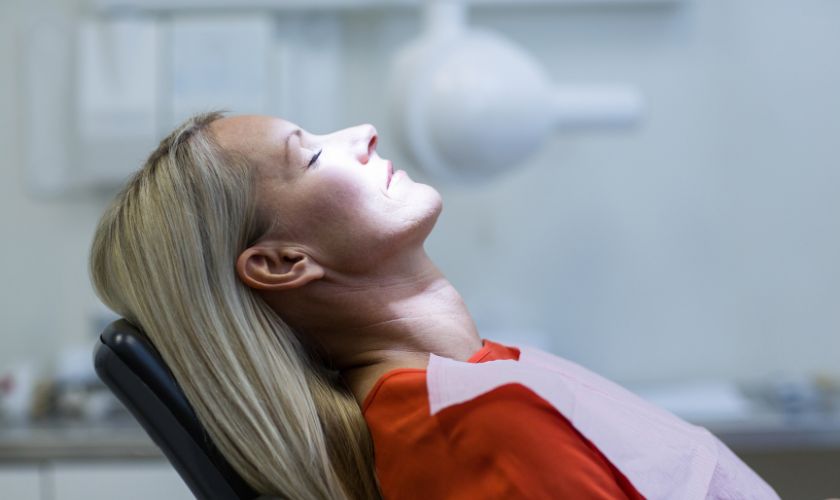Are you one of the many people who dread going to the dentist? Do you feel anxious and tense before and during dental appointments? If so, you’re not alone. Many people experience fear or anxiety when it comes to dental visits, which can make it difficult to get the care they need for a healthy smile. But what if there was a way to relax your way to better oral health? That’s where dental relaxation comes in. By using techniques like deep breathing, guided imagery, and music therapy, you can create a calming atmosphere that makes even the most dreaded procedures more manageable. In this blog post, we’ll explore the benefits of dental relaxation and show you how it can help improve your overall health and well-being.
What Is Dental Relaxation?
Dental relaxation is a process that can help you reduce stress and anxiety before and during dental procedures. It can also help improve your overall oral health. There are several different ways to achieve dental relaxation, including deep breathing exercises, visualization techniques, and listening to soothing music.
Benefits Of Dental Relaxation
Dental relaxation is a process that can help you to improve your oral health. It involves using techniques such as meditation and breathing exercises to relax your body and mind. This can help to reduce stress and anxiety, which can lead to improved oral health. There are many benefits of dental relaxation, including:
1. Reduced Anxiety
Dental relaxation techniques such as deep breathing, visualization, and meditation can help reduce anxiety and promote relaxation during dental visits. When you are relaxed, your body releases fewer stress hormones, which can help lower your heart rate and blood pressure. This can make dental appointments less stressful and more comfortable.
2. Reduced Pain
Dental relaxation techniques can also help reduce pain during dental procedures. When you are relaxed, your body produces more endorphins, which are natural painkillers. This can help reduce the pain associated with dental procedures, making them more comfortable and tolerable.
3. Improved Oral Health
Regular dental visits are essential for maintaining good oral health. By using relaxation techniques to reduce anxiety and pain during dental appointments, you are more likely to keep up with regular dental visits, which can help prevent oral health problems from developing or getting worse.
4. Improved Overall Health
Good oral health is closely linked to overall health and well-being. By promoting relaxation and reducing stress during dental appointments, you may also experience benefits such as improved sleep, reduced anxiety and depression, and better immune system function.
5. Access to More Comprehensive Dental Care
Many people avoid dental visits due to anxiety or fear of pain, which can lead to more extensive dental problems. By using relaxation techniques, you may be able to tolerate more extensive dental procedures, which can help prevent dental problems from becoming more severe and requiring more invasive treatments.
Dental relaxation techniques offer numerous benefits, including reduced anxiety and pain, improved oral and overall health, and access to more comprehensive dental care. If you experience anxiety or fear during dental appointments, consider incorporating relaxation techniques into your dental care routine. Talk to your dentist about relaxation techniques that may be right for you.
How To Relax During Your Dental Visit?
If you experience anxiety or fear during dental appointments, there are several techniques you can use to promote relaxation and reduce stress. In this section, we will discuss how to relax during your dental visit.
1. Deep Breathing
Deep breathing is a simple and effective way to promote relaxation during dental appointments. Take slow, deep breaths in through your nose and out through your mouth, focusing on your breath and allowing your body to relax.
2. Visualization
Visualization involves creating a mental image of a calm and peaceful scene. Close your eyes and imagine yourself in a relaxing environment, such as a beach or forest. Focus on the details of the scene, such as the sound of the waves or the rustling of leaves.
3. Meditation
Meditation involves focusing your attention on a specific object, sound, or thought to promote relaxation and reduce stress. You can practice meditation during dental appointments by focusing on your breath, repeating a mantra, or visualizing a peaceful scene.
4. Distraction
Distraction techniques involve focusing your attention on something other than the dental procedure, such as music or a movie. Bring headphones and listen to music or an audiobook during your appointment to help distract your mind from the procedure.
5. Communication
Communication with your dentist is important in promoting relaxation during dental appointments. Let your dentist know about any fears or concerns you have, and work together to develop a plan to make the appointment as comfortable and stress-free as possible.
There are several techniques you can use to promote relaxation during dental appointments, including deep breathing, visualization, meditation, distraction, and communication with your dentist. Experiment with different techniques to find what works best for you, and remember that dental visits can be a positive and stress-free experience with the right tools and support.
Stress and anxiety can take a toll on all aspects of our health, including the health of our teeth and gums. Practicing dental relaxation techniques is a great way to get your mouth into shape while also improving your overall well-being. Not only will it help relax your muscles and reduce clenching or grinding, but it can also improve circulation in the area and allow for better oral hygiene as well as fewer cavities. With all these benefits, investing time in dental relaxation could be one of the best decisions you make for a healthier smile!



